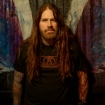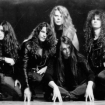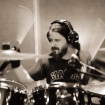New to the Revolver store are exclusive colored vinyl editions of Forbidden's first two albums, Forbidden Evil and Twisted Into Form. They're limited to 250 each so get yours before they're gone!
By the time Forbidden released their debut album, Forbidden Evil, on September 30th, 1988, the NorCal crew had some big shoes to fill. The Bay Area thrash scene had already given birth to many important and highly influential metal acts including Exodus, Death Angel, Testament, Possessed and, of course, Metallica (who had relocated from Southern California in 1983).
Forbidden had been kicking around the scene for three years up to that point, so they were well aware of the region's legacy — and the need to come out guns blazing with their debut. And they delivered. Upon its release, Forbidden Evil caused such a ruckus in underground metal circles that it made people outside the Bay Area once again stand up and take notice of what was happening on the West Coast.
By the end of 1988, Forbidden — which then consisted of vocalist Russ Anderson, guitarists Craig Locicero and Glen Alvelais, bassist Matt Camacho and drummer Paul Bostaph — were all the rage thanks to their fierce debut. Opener "Chalice of Blood" sets the tone for Forbidden Evil — exploding with intricate, smart riffing, abrupt tempo changes, gang choruses and furious lead breaks (not to mention Anderson's high-pitched opening wail, which recalls Tom Araya's legendary "Angel of Death" intro scream). In many ways, Forbidden Evil was a continuation of the expert tech-thrash that had become synonymous with the Bay Area scene in the mid Eighties — or maybe it was its second coming. Either way, Forbidden were clearly viewed as the hot young band primed to take the genre to new heights.
Forbidden's beginnings date back to 1985, when drummer Jim Pittman and guitarist Robb Flynn (who later joined Vio-lence before forming Machine Head), decided to start a band. Guitarist Craig Locicero, who was friendly with Flynn at the time — "we met over a love for thrash metal," says Locicero — recalls his first impressions upon seeing the still-unnamed group in action. "I was 15 at the time, and I'll never forget the first time I went down to check them out and I saw Russ sing. He was a big, gigantic bleach-blonde guy — just monstrous. I watched them do 'Hell Bent for Leather,' 'Restless and Wild' and 'Am I Evil?' and I just sat there thinking to myself, I've got to be in this band. I'd never seen anyone sing like that right in front of my face. Russ was just incredible."
With Locicero on board, the group moved operations to the guitarist's garage in his mother's house, which is where things began to fall into place. "It was Robb, Russ, Jim and John Tegio on bass, but they weren't really a band yet — they had no original songs, and they were ping-ponging back and forth between a few different names. Once we moved everything over to my garage and started practicing, we became a band and settled on the name Forbidden Evil."
From there, things progressed quickly for the group, which ultimately shortened its name to Forbidden. By the end of 1987, the band was being managed by Debbie Abono (who had previously worked with Possessed and Exodus) and early the next year the group signed a deal with Combat Records — after turning down offers from Metal Blade, Roadrunner, Capitol and Mechanic. "We felt that Combat had the best track record," Locicero recalls of the decision.
Forbidden's second album, 1990's Twisted into Form, was a more melodic and progressive effort from the group and is widely hailed as one of the last great Bay Area thrash albums before the scene became lost in the Nineties alt-sauce. Forbidden had a difficult time maintaining its momentum throughout the Nineties and disbanded in 1997. Various reunion shows and tours occurred in the early 2000s, with a fifth and final album, Omega Wave, released in 2010. Since 2012, Forbidden has been on indefinite hiatus.
"Nothing is going on with Forbidden," says Locicero, whose priority these days is his down-tuned metal band Dress the Dead with singer Kayla Dixon. "I talk to everyone and we're all still friends, but I'm just not interested in getting Forbidden back together. Russ had a serious bout with alcohol in 2019 — he came out of it and is feeling better, but he's a long way off from being able to think about getting back up onstage and performing. And if it's not Russ and it's not Matt and it's not me, then it's not Forbidden."
Below, Locicero offers up five things you might not know about Forbidden's early days and the creation of Forbidden Evil.
1. Vio-lence famously poached Robb Flynn before Forbidden Evil's recording — but they actually tried to woo Craig Locicero first
It's well-known thrash history that guitarist Robb Flynn — who's credited with writing Forbidden Evil's title-track, "Chalice of Blood" and "As Good As Dead" — left to join Vio-lence before Forbidden recorded their debut album. But Flynn wasn't the only Forbidden member that Vio-lence had their eye on. As it turns out, Locicero was the first one asked to jump ship.
"Jerry Birr, the original Vio-lence vocalist, and drummer Perry Strickland just showed up at my house one day and asked me to join," says Locicero. "I was like, 'Why are you asking me? Why don't you want Robb?' And they both said, 'Because you're Vio-lence material, bro.' I wasn't really sure what they meant by that, because I'm more into melodic metal than what Vio-lence was doing at the time. But I said thanks anyway, and when they left I was like, 'Oh well, that was cool.' But I didn't have to think twice about not joining — I've always been very loyal to Forbidden, and at the time my thinking was, 'I've got this band, and I've got Robb and Russ — why would I want to join Vio-lence?' Then they got Robb, and he was Vio-lence material for sure — he was the right guy for that gig."
2. Flynn's departure primed Vio-lence to become thrash's next big thing — but Forbidden Evil crushed that dream
It was the spring of 1986, and Forbidden Evil were scheduled to record the Endless Slaughter demo tape at Fast & Furious Studios in Fremont, California. Shortly before recording began, guitarist Robb Flynn (then "Rob") showed up with his arm in a sling. He said it was broken and he couldn't track his parts. Recording was pushed back to May 1 to allow Flynn time to heal. "Robb came to practice the night before we were set to record, and he was just playing great," says Locicero. "We were all like, 'Wow, how does a guy come back from a broken arm so fast and play so good?' We were all blown away.
"After we recorded the demo, Robb went away for a week, and when he came back, he called a band meeting and told us that he was leaving to join Vio-lence. We were all so pissed and we felt betrayed because he never had a broken arm — he was just rehearsing with them the whole time. It was very disingenuous, but that's what kids do when they want to avoid confrontation. And the whole thing caused a tremendous amount of competition between the two bands. Once they got Robb, they figured that nothing was going to stop them and they were just gonna walk all over everybody. They had this take-no-prisoners attitude — like, fuck you, fuck your friends, fuck everything. They were just terrorizing and it worked for them. And it caused a lot of separation within the scene — a lot of people were torn between Vio-lence and other bands. But we were definitely the nicer guys, no doubt about it.
And for a while, it really seemed like they were headed toward the top — but when Forbidden Evil came out, things changed. Our album dwarfed theirs in sales, we got better tours, and it really bothered them, which caused even more bad blood between our bands. It wasn't our fault — we were just existing, but we weren't jealous of them or any other band. And I can tell all these stories now and laugh about them — there's no malice or ill-will or anything like that. Robb and I are better friends now than we ever were as kids."
3. Rick Rubin loved Forbidden Evil so much he offered Forbidden a record deal — but their manager Debbie Abono turned it down without even telling the band
Upon its release in September 1988, Forbidden Evil secured Forbidden's spot at the top of the thrash's second wave. Although the group didn't know it at the time, Def American label founder Rick Rubin — the man who had recently produced Slayer's Reign in Blood and South of Heaven — was one of Forbidden's biggest fans. The bearded impresario even wanted to sign Forbidden to his label, but manager Debbie Abono passed without consulting the group.
"Rick loved Forbidden Evil — he thought it was the greatest thing," says Locicero. "In the way that he loved Slayer's Hell Awaits, he wanted to take the energy we had on Forbidden Evil and put his production on it. He wanted to buy us from Combat, and Debbie turned him down and didn't tell us about it until a while later. She told us one night when she was mad at us: 'I turned down a deal with Def American!' We were like, 'What? What are you talking about?' But that's how Debbie was. If she didn't think you were ready for something, she wasn't going to just let you jump out there and do it. And god bless her, because she was probably right about 95 percent of the time. But the thing with Rick Rubin was probably the catalyst that led to us having to fire her — I know that Paul never really forgave her for that until much later."
4. Russ Anderson recorded his Forbidden Evil vocals in one day
After signing with Combat in the spring of 1988, Forbidden quickly found themselves in the studio recording their debut album, Forbidden Evil. The group recorded most of the music for the record at Alpha & Omega and Hyde Street Studios in San Francisco, and relocated briefly to Prairie Sun in Cotati, California — it was there that vocalist Russ Anderson had to record all the vocals for the album in a single day.
"We had probably run out of time at Alpha & Omega," recalls Locicero, "so we moved over to Prairie Sun for one day so that Russ could record his vocals. The crazy thing is that I wasn't even there that day because our other guitar player, Glen Alvelais, didn't want to pick me up! I had actually written a lot of the vocal melodies and lyrics for those songs, but I missed out on the recording because Glen just didn't want to pick me up. So when I first heard the finished album, I didn't like a lot of it because the vocals were different than what I expected, and it took me a while to get used to them. But even to this day, I'm still amazed at how good it is — to think that Russ sang that entire record in one day is mind-blowing to me. That guy can sing."
5. Guitarist Glen Alvelais tried to sneak a solo instrumental track onto Forbidden Evil
During the recording of Forbidden Evil, the band arrived at Alpha & Omega Studios one day and found guitarist Glen Alvelais already there — recording a track the others knew nothing about.
"We saw that Glen had gotten there early and was laying down his own instrumental that he never told anyone he was going to do," recalls Locicero. "We were all like, 'Wait, what is this? No dude.' Glen was really into guys like Joe Satriani, and he thought that being on Combat was gonna be like being on Relativity [Combat's parent label] and doing solo records. We were like, 'No dude, you're in a band.' I remember that Paul Bostaph was super-mad — his top was ready to blow when he walked in. 'He wasted how much time doing that?!' He was just flipping out. That was the beginning of us realizing that we were going to have to either calm this guy down or let him go. And he didn't last in the band past the first European tour the following year."








